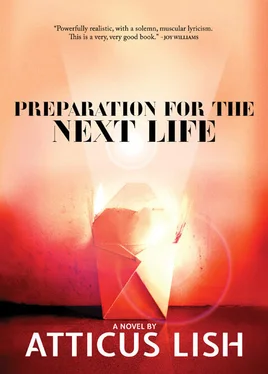She made a rule: if you thought he wasn’t coming and you were going to give up, then, if you waited a little more, you would be rewarded and he would come.
IT WAS NIGHT. THE trucks gunned down the freeway and the sound reverberated over her, the air blast whoofing between the houses. She had started walking after sundown, when the sky changed colors above the fragmented clouds, after she had given up and held out a little more and not been rewarded, and this had happened twice. All she knew was that she had been abandoned. She was desperate and could not bear to think. She didn’t know what she was doing. She was going to go away, just go and keep going until the world ended or she ended.
Somehow she had gotten on the train without paying, and now she was riding in the hypnotic noise. They went underground in Manhattan, the white people got off, and the subway headed into Brooklyn. The air conditioning was raining on the gray seats, on the West Indians and Africans. A policeman put his head out on the platform at every stop.
At the last stop, the track ended and another train was parked there on the other track. The crowd got off and she got off. The cops switched trains. There was beige marine paint on the walls. It smelled like a toilet. Jamaicans bounded up the cement steps as she was going down. Little thin children followed them in thrift clothes. There was water on the sidewalk, and she could smell the sewer. She saw in people’s second-floor windows above restaurants and discount stores. The fried-food smell hit her. Cars drove through the intersection, a channel of soft green and violet neon lights, playing music. A starved shaved-headed cholo was driving a gold car. They were coming in from somewhere else, looking for a good time. You saw their serious faces, playing different music in each car, their friends in the back seats in baseball hats, being driven. Someone honked in celebration. A Cadillac jalopy driven by a single male stopped at the light. His music was exuberant, and he was calling out: We can get it bumping like champagne bubbles! He had no headlights. She crossed in front of him and headed down Liberty Avenue.
She passed the Good Hope Restaurant, the Sparkles Bar and Lounge, a young male standing up on a bike, slaloming in the street, his black hat sideways and a cigarette behind his ear. His shirt said Hustle Trees. She passed homeless scrap hunters with dank iron-gray hair and gloves and sweatpants, digging in the garbage. They were Indian, they knew each other. They stopped and consulted with each other where the better hunting was, and one went off, towing his shopping cart behind him. A women walked by her like a zombie with scar tissue from a burn on her cheek and jaw. She passed the Dabar Halal Restaurant, a green awning and white light and cab drivers eating off of trays.
As she left the intersection behind, the street got darker. Looking back, she saw a red police light strobing in the traffic, glowing on the low houses from which reggae played. Ahead, she saw an unlit mosque behind a car lot festooned with triangular flags strung up in the shadow. Above the telephone lines, there was a dime-sized moon. She was heading east to Freeport. The cars came by in bursts in the half-mile stretches between markets selling fruit. The other stores were closed. Taped to the side of a building, she saw a poster for a healer. The words, which she did not stop to try and read, said Remove Black Magic. In the picture, the healer’s uplifted face was painted red and yellow. She passed by boarded-up storefront churches with massive trees rising up behind them and spreading over them in the dark. A faded sign on a board above her head said the Seven Crowns of Glory. A man came along in a hood, beard, shorts, socks like puttees, having harnessed himself with two clotheslines, pulling a shopping cart after him, loaded like a caravan with garbage bags. A black car cruised by booming: One nation… under God… real niggas… getting money. Women getting ready for a party in a parked van traded makeup from their purses. The streets became irregular, cut in triangles. She came to buses parked along the median, cars left on the sidewalk. Her path was blocked by a wrecked Crown Victoria with the doors torn off, the back seat in the front seat, the roof compressed like a sandwich, and the windshield glass blown out on the pavement, and she went around it and kept walking in the street. She cheated over for the oncoming traffic. There began to be auto repairs. She saw a Domino’s. The driver in his blue and red shirt got out of his car and went inside dragging the insulated bag for the pizzas.
For a quarter mile there would be nothing, and then she would encounter a person. She would see two guys in janitor’s trousers sitting on a porch half hidden by a hedge, opening a bottle. Then she would come to the valley of light around a gas station where a young male, his skin the same color as his black t-shirt, was putting gas in a dented Elantra. There was barbed wire on top of a beverage distributor. She crossed a freeway, and it felt like the rest of America, the vast concrete speedway echoing and echoing. Back in the streets again, she passed cars parked on the side of the road, two women in the front texting, perhaps Hispanic. One wore glasses, had a long nose. She passed the club JouVay next to a masonry supply, music reverberating up through the roof.
Late as it was on a Saturday night, you still saw people here and there struggling with laundry bags, garbage bags full of clothes, perhaps moving somewhere else to stay or engaged in some kind of labor. She saw four women sitting around on cars in the hot night apparently doing nothing except talking. A drunken Central American man was headed towards them, taking long staggering runs back and forth down the sidewalk. They had short hair like lesbians. One of the big women stood up where she had been sitting in a doorway with her girlfriends. He stared speechlessly at her, then staggered on as if he had decided that it was all no use. Hey, papito, come back! the woman called. Let him go, her girlfriends said. The woman said, No. I need that money. Afuera, she called loudly in a pleasant voice. Papi, ven aquí!
Zou Lei walked through them, pressing on against the cars flying by, against the pavement and the time of night, against the understanding that she should have stopped miles ago, that what she was doing did not make sense. She could not stop. Twenty minutes later, she had a bad spell when everything caught up with her at once. She suddenly got hit by hunger, as if something had gotten switched-off inside her, and she didn’t know what to do. She was standing on a corner in the dark, having gotten beyond the lounges and BBQ ribs and the wines and liquors, to a barren terrain of salvage yards. The avenue itself had become a highway, cars speeding by, raising dust from the gravel in the road, and the gutters were filled with trash and water. The only thing between her feet and the pavement was her shower shoes. There was nothing to go back to if she turned back. She had nothing in her stomach. She looked like a prostitute out here. There was nothing in her pockets and she was scared.
A wide car with little fins above the taillights separated from the wave of traffic and came slowing down to the curb and stopped. The people in the car were a black couple. An NYPD van stopped behind it. She was afraid to stay where she was, and she kept moving. The light was on in the police van and she saw one of the officers, his hair gelled up, take a quick glance at her as he entered information in a keyboard mounted on the dash. In her mind, she practiced saying, My friend live up the street. I come out for bread. I get lost. I so sorry.
What would happen if she told him what had happened to her today? If I weren’t lucky, maybe I would not be here. She had escaped, but she had lost her money, her ID, her phone, even her shoes.
Читать дальше












